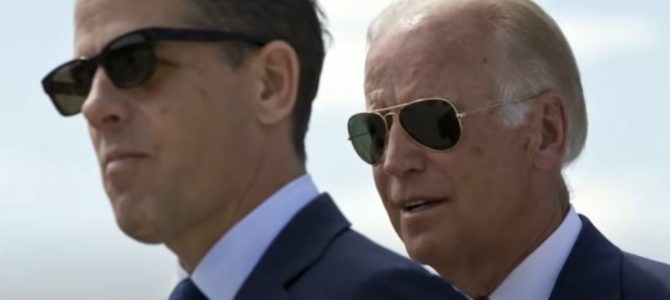
The Senate Homeland Security and Governmental Affairs Committee released the first part of its long-awaited report with the Senate Treasury Committee Wednesday detailing a wide array of Hunter Biden’s conflicts of interest, including potentially criminal overseas business activity while his father Joe Biden served as vice president.
Among the key findings in the report are substantial allegations that Mykola Zlochevsky, the owner of the Ukrainian energy company Burisma, from which Hunter Biden raked in upwards of $50,000 a month for serving the board, paid a $7 million bribe to the Ukrainian prosecutor general’s office to close an investigation seven months following Hunter Biden’s addition to its leadership.
According to the report, U.S. Deputy Assistant Secretary of State George Kent, the State Department’s top official on Ukraine, told congressional investigators that he learned of the bribe from First Deputy Prosecutor General Anatoliy Danylenko during a Kyiv meeting on Feb. 3., 2015. The bribe was meant to close Ukrainian investigations and release $23 million of Zlochevsky’s frozen assets by British officials. At the time, Daylenko was the country’s number two prosecutor serving under Ukraine’s Prosecutor General Vitaly Yarema. One week after Kent confrontation with Danylenko, Ukrainian President Petro Poroshenko fired Yarema and other members of his team.
Kent testified that he learned shortly after the meeting with Danylenko that Hunter Biden was sitting on the board of the Ukrainian energy company owned by Zlochevsky. Biden’s role was supposedly to consult on corporate governance and transparency. Hunter Biden joined the firm and raked in excess compensation despite no prior experience in the industry just weeks after his business partner, Devon Archer, met with Joe Biden at the White House. Joe Biden had just recently been described by the press as the Obama administration’s “public face of the administration’s handling of Ukraine.”
Kent reportedly told lawmakers that the Department of Justice official at the U.S. embassy in Kyiv relayed the allegation of Zlochevsky’s $7 million bribe to the FBI. The Senate committees are still awaiting answers on what actions the federal law enforcement agency took, if any.
Kent also told lawmakers that upon learning of Hunter Biden’s lucrative role on Burisma’s board, he raised his concerns with the vice president’s office. The top State Department official testified over the course of President Donald Trump’s impeachment hearings that his discomfort about the situation was brushed off by the administration.
“I raised my concerns that I had heard that Hunter Biden was on the board of a company owned by somebody that the U.S. Government had spent money trying to get tens of millions of dollars back and that could create the perception of a conflict of interest,” Kent told House members during a private deposition in October last year. “The message that I recall hearing back was that the vice president’s son Beau was dying of cancer and that there was no further bandwidth to deal with family-related issues at that time… That was the end of that conversation.”
State Department officials, according to the Senate report, widely viewed Zlochevsky as a corrupt, “odious oligarch” who Kent described as “a poster child for corrupt behavior.”
“I would have advised any American not to get on the board of Zlochevsky’s company,” Kent said, telling colleagues in 2016 Zlochevsky “almost certainly paid off the [prosecutors] in December 2014.”
Vice President Joe Biden however, refused to launch accusations of corruption against Zlochevsky.
“The committees were not able to locate any public statements Vice President Biden gave from 2014 to 2016 in which he called Zlochevsky corrupt,” Senate investigators wrote in the joint report.
Instead, a Biden spokesperson told reporters, “the vice president does not endorse any particular company and has no involvement with this company.”
The Senate’s report marks the first phase of revelations to emerge from the probe launched in 2017, long before Joe Biden jumped into the crowded presidential race in the spring of 2019.
In a desperate bid to shut down the investigation out of concern that its findings could harm their attempt at the White House in November, Democrats, true to form, repeatedly attacked the ongoing probe as an instrument of Russian interference in the upcoming U.S. election, accusing Republican senators of being Kremlin agents.
Even Democrats on the committees attempted to undermine the Republican-led probe by leaking selected material to the same press that suddenly began re-characterizing the ongoing three-year investigation as a political weapon being wielded against the Biden campaign once it was clear that the former vice president was going to capture the Democratic nomination.
Multiple letter requests prior to Biden’s March Super Tuesday victories show, however, that the probe aimed to wrap up much sooner before the pandemic-related shutdowns and a partisan impeachment distracted the government from its oversight work and the coronavirus brewing overseas.









